Hong Kong
Hong Kong Culture
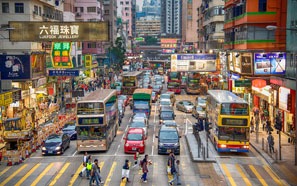 Hong Kong people have a crowded but surprisingly wealthy and healthy style of life.
Hong Kong people have a crowded but surprisingly wealthy and healthy style of life.
Hong Kong culture is a mixture of traditional Han Cantonese ethnic culture of southeastern China and British and Western culture in general. Hong Kongers are being increasingly influenced by the culture of the Mainland Chinese. Their culture is sophisticated and mixes Confucian and British ethics, and they are international savvy.
Local Hong Kongers are proud of their region and their accomplishments, and they want to preserve their culture. Understanding their culture involves understanding their history and present circumstances and becoming familiar with their language, customs, ideals, ethics, diet, and business practices. Their culture is a fusion of East and West. It is a unique culture and the world's most successful culture in several ways.
What is Hong Kong Culture?
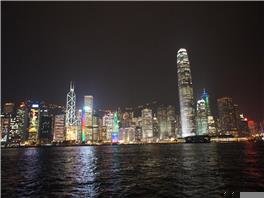 Like Victoria Harbour, Hong Kong culture exhibits a mix of Chinese and Western.
Like Victoria Harbour, Hong Kong culture exhibits a mix of Chinese and Western.
Hong Kong people often call themselves "Hong Kongers" in English. In a recent poll, about 67% self identified themselves as Hong Kongers.
In Hong Kong, about 8 percent of the permanent residents are not of Chinese descent. Depending on how long they have lived in Hong Kong or whether they are first, second, or third generation Hong Kongers, they may share the same basic core values and ways of thinking, basically the same culture, as the ethnically Chinese Hong Kongers, and of course they also retain a lot of the culture of their ancestral countries too.
Hong Kong culture is basically the culture of the native Chinese who were born there during the period of British rule or in the 22 years since the reversion to Chinese rule. Under British rule, through foreign media influence and their everyday contact with foreigners both in Hong Kong and abroad because many traveled for business, work, and education, during the last century and a half, their distinctive Western/Eastern fusion culture has emerged. Their culture is a fusion of the cultures of China, Britain and other Western countries.
Hong Kong Culture is Different to Mainland China Culture
Their everyday behavior, demeaner and attitudes are noticeably different even to tourists and travelers who have interacted with Mainlanders and local Hong Kongers just a short time. It is not just their Cantonese language that makes them different. They often smile more, seem happier, and are more polite and circumspect in public.
Language: English and Cantonese are their official languages. They speak Cantonese in everyday discourse though they might also speak other Chinese languages and dialects. About 54% speak English. About 95 percent of the Hong Kong people speak Cantonese, and about 49 percent can speak Mandarin that is the official language of China. About 90 percent of the Hong Kong people speak Cantonese at home. See more on Hong Kong Languages: Background and Helpful Travel Tips.
How Hong Kong's History Has Formed the Amazing Fusion Culture
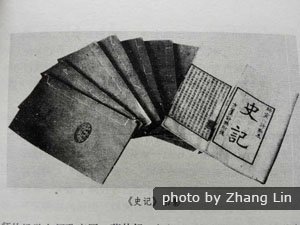 Hong Kong culture originated in the culture of the Han people that was first basically defined in the Han dynasty era (206 BC – 220 AD). The picture shows the historical records of Sima Qian, a Han-era historian.
Hong Kong culture originated in the culture of the Han people that was first basically defined in the Han dynasty era (206 BC – 220 AD). The picture shows the historical records of Sima Qian, a Han-era historian.
To understand the Hong Kong culture, it is good to know how Hong Kong originated as a semi-independent region. The basic underlying culture is the traditional culture of the Han people.
The Han ethnic group started to expand from around the Beijing region of China about 4,000 years ago. Qin Empire (221–206 BC) troops conquered the region of Hong Kong about 221 BC, and after that, the area was the territory of successive Han, Mongol, and Manchu dynasties.
So, much of Hong Kong culture derives from the ancient Han culture that developed in the Guangdong Province region during the last two millennia.
A Different Cultural Trajectory of Development (about 800 AD to 1841)
For various reasons, the Cantonese people in Guandong Province, on the outskirts of the big empires, have a culture different than the culture of most of the Han people north of them. Their Cantonese language is quite different than the dialects spoken by most of the Han Chinese who speak Mandarin or dialects that are somewhat more akin to Mandarin.
Much foreign influence: But most importantly, for various historical reasons, the Guangdong Cantonese people have for many centuries had much more contact with foreigners and other countries, and they engaged in foreign trade and travel more than most Han Chinese. This experience has made them more entrepreneurial and internationally orientated.
From about 220 AD to about 1100 AD, there were at times large numbers of foreigners in the Canton (Guangzhou) area engaging in trade since it was one of the main foreign trading cities. Nearby Macau became a Portuguese territory in 1557, and a large Portuguese town grew there during the past few centuries increasing the Cantonese people's experience with foreigners. Their culture was colored with foreign influences.
During the Qing Dynasty (1644–1912), in 1684, the Emperor ordered that Canton, Zhuhai, and Macau (all towns and cities around Hong Kong) be three of the Qing Empires's few open trading ports. It 1757, the Canton Factories area in Guangzhou was made the only legal location for foreign trade in the Qing Empire. The foreign settlement there increased the Cantonese people's contact and business with Westerners.
So for these historical reasons, the Cantonese have had much more contact with Westerners than most Han people for centuries, and through their trade and travel endeavors, their culture became more cosmopolitan and pluralistic.
Westernized Under Early British Rule (1841 to 1941)
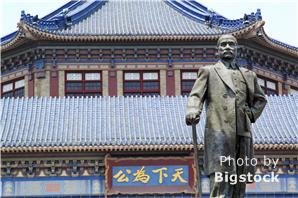 Dr. Sun Yat-sen Memorial Hall in Guangzhou
Dr. Sun Yat-sen Memorial Hall in Guangzhou
The British have had the biggest foreign cultural influence on modern Hong Kongers. Hong Kong was a British colony from 1841 to 1997. The British government and other foreigners opened schools that taught mainly British Protestant ideals and philosophy and promoted the Christian religion and ideology.
Around the turn of the 19th century, Hong Kong became a center for education and political and social activism for Cantonese people. The schools and universities in Hong Kong graduated many Chinese who wanted the overthrow of the Qing Dynasty and for China to modernize and become more democratic.
Sun Yat-sen was one of the first graduates of a Christian medical college in Hong Kong. He became very influential in the Hong Kong and Guangdong area. Along with fellow Hong Kong medical students, he started an organization to overthrow the Qing Empire and establish a new national government. He became the first President of China.
Healthy Economic Development and the Tradition of Government after WWII (1945 to 1997)
After 1949, hundreds of thousands of people fled to Hong Kong from China. Many of the people were educated, skilled, or had some capital. An industrial boom made Hong Kong one of the four “Asian Tigers” economies.
However, unlike the other newly industrialized economies (NICs) in East Asia, under British rule the colony developed what is known as a laissez-faire economy where most people worked in small private firms and the government did little to promote or regulate industry. Taxation was set very low, and regulations and government intervention and corruption was comparatively little.
Core Traditional British Values and Culture in Government
Administration of the city was handled by the local Hong Kongers after WWII, and the local government and people adopted the best of the traditional British ethics and values of fairness, honesty, personal freedom, free speech and open political discourse. They developed a unique tradition of laissez faire business, and their government had little intervention and control of the people's daily lives.
Hong Kongers became the only non-Western people in Asia living under a government with these ideals and traditions. In contrast, the cultures of East Asia generally emphasize governmental hierarchical control. Hong Kong was said to have the freest economy in the world for business.
This environment gave the local Hong Kongers a sense of personal independence. They developed an appreciation for hard work and for the personal freedoms of others, and they became daring entrepreneurs. They also developed a greater sense of internationalism since many studied and worked overseas throughout the world, and their economy thrived from the export trade and foreign commerce.
They became more pluralistic since hundreds of thousands of foreigners, a large part of the population, have worked and lived in Hong Kong for decades. Since the 1990s, there has been a foreign resident population of about 500,000 or more.
The Big Foreign Social Influence
The foreigners have much influenced Hong Kong's culture since tens of thousands have had much influence in the corporate world as executives and managers, and a large percentage of them have been teachers, church leaders or worked in the charitable and civic organizations. Hundreds of thousands of Hong Kong people have even lived with foreigners since domestic helpers lived in their houses.
The foreigner population has included British and Commonwealth government staff, soldiers and police, business people from all over the world, South Asian immigrants, foreign workers, and hundreds of thousands of Filipino and Indonesian domestic helpers and laborers.
They also developed an unusually high sense of civic responsibility since under British control and afterwards, the government has maintained a non-interventionist stance in the daily lives of the people. Many private charities, community organizations and civic organizations were formed to help the public and promote community welfare.
These organizations built many hospitals, clinics, elderly homes, and even large educational and recreational facilities such as Ocean Park that have served the people well. Ocean Park is one of the world's largest and most popular amusement parks, and it doubles as an educational and research facility.
Grew to Be a Successful Culture Economically
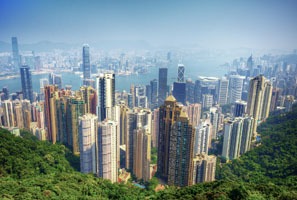 Hong Kong has more skyscrapers than any other city, and travelers say that the city is one of the world's most beautiful.
Hong Kong has more skyscrapers than any other city, and travelers say that the city is one of the world's most beautiful.
Through their hard work and with their form of government and cultural ideals, the Hong Kong people prospered to become the wealthiest city in the world and one of the world's top cities for business and finance, and this success served to reinforce these core values and give Hong Kongers a sense of personal and civic pride in their region and culture.
They also have become materialistic and highly fashion and wealth conscious. So the market for things like luxury fashion, brand name clothes, and the best and latest personal electronics is huge in Hong Kong since they are noticeable status symbols. Social status and even personal worth is determined by wealth and educational attainment to a high degree, so the locals work extremely hard compared to most people in the world.
The Maintenance of the Local Culture Under Chinese Rule (1997 to the Present)
In 1997, Hong Kong was transferred to China, and they became a Special Administered Region. It has been widely regarded as the world's most outstanding and well-run city in the world in the last fifteen years.
The government is openly criticized and kept in toe by Hong Kong's vocal citizens and a media that is still fairly free to criticize the local government officials and their policy decisions and the police.
Increasing Cultural Conflict between Mainlanders and Hong Kongers
Mainland Chinese have been moving to Hong Kong since 1997, so now about 20 percent or 1.5 million of Hong Kong's residents are Mainland Chinese, and they are making the region's culture more like that of the Mainland.
Their presence as well as the presence of hundreds of thousands of Chinese tourists on any given day is influencing the local culture, and cultural conflict is increasing. The locals generally resent their presence and fear for the future of their traditions and lifestyles.
Such large numbers of Mainlanders are coming because they have more wealth and time for travel and tourism, and transportation to the region is becoming increasingly convenient and economical with the opening in 2018 of a mega-sized bridge over the sea to Macau and Zhuhai and a new bullet train that connects locations far away in China directly to Kowloon. Other large transportation facilities such as bridges and highways have been built in the past 12 years.
In 2018, Hong Kong attracted a record number of 51 million mainland visitors. They were 4/5 of the record 65 million visitors in that year. This is by far the highest number of visitors in the world.
However the frequent protests and occasional large demonstrations have helped to promote the Hong Kongers' sense of being different and their appreciation for their own Hong Kong local culture. Laws have been passed limiting the Mainlander presence in Hong Kong, but the number of tourists actually keep increasing anyway because Chinese are so eager to go there to shop, sightsee, and for recreation.
For more about Hong Kong's history, see Hong Kong History.
The Mixing and Conflicting of Eastern and Western Values
From the Han Chinese tradition, the Hong Kongers have Confucian values, philosophy and religion such as a strong sense of social hierarchy especially within families and at the workplace, the shame-based concept of "face", and a very strong sense of the importance of education. Traditional Chinese customs, holidays, philosophy and religious ideas are part of everyday life. There is a respect for age.
Another Han value is the value of investment in construction of huge megaprojects. Megaprojects are everywhere in Hong Kong from the world's tallest skyline with more skyscrapers than any other city to one of the world's biggest subway systems down below ground.
However, the foreign and especially the British influence and example have instilled the Western values described above too. There is a universal appreciation and practice in Hong Kong of Western holidays such as Christmas, the English language, and English-language entertainment and media.
There is an unusual love for nature that manifests in that most of the territory is still preserved as natural public country parkland even though the pressures for development and urban growth are very intense.
Conflicting Western and Eastern Values and Ideals
Hong Kong people have internal conflicts on which ideals and values to uphold and follow both in their own lives and in their practice in groups. It is obvious that the two value systems conflict, and based on age, religion, and social grouping, each individual Hong Kong person has had to determine what their own values and philosophy are.
Many Hong Kong residents, about 12%, identify themselves as Christian, and they may not participate in traditional Chinese religious customs for example.
Also, younger people in general tend to reject traditional values such as filial piety and obedience to leaders to a much higher degree than their elders. Younger people tend to be more individualistic than their elders who are more collectivistic and may seek to control their children's lives or the lives of their subordinates. These differences of opinion often lead to clashes within families, on the job, and in the public forum.
See more about Hong Konger religions below.
A Great Emphasis on Education
There is an extreme emphasis on schooling, and the wealthiest families often send their children to be educated abroad in English-speaking countries, or their children attend private and Christian academies that are usually very expensive. The competition to enter and excel in these academies and the best schools and universities is intense, so Hong Kong children study unusually intensely and receive schooling and training from early ages.
This might be what has contributed to Hong Kong being the region or country with the highest average IQ in the world of 107 compared to the usual 100 in the Mainland and many countries in the world. This emphasis on education in Hong Kong is comparable to the Japanese emphasis. Japan's average IQ is 105.
About 24 percent of Hong Kongers have a college level degree or above, and Hong Kong's universities are regarded as some of the best in East Asia with first-rate facilities, faculty and research.
The Culture Contributes to Hong Kong's Success
It is intriguing that a relatively infertile and poor small area on the outskirts of China became one of the world’s main trade and financial centers, the world's wealthiest city with the highest IQ, the territory or country with the world's longest average lifespan, and the world's favorite city for tourism. Hong Kong is rated among the top or the very top city in the world in a number of important international comparisons.
This unique mixing of Eastern and Western values and ideals has produced some outstanding results. The unusual honesty and good governance of the British cultural tradition along with the traditional value placed on education, hard work, and respect for authority has produced tangible good results.
Better Government, Police and Judicial System
For example, unlike in many countries around the world, the people don't automatically expect the local police to be corrupt on everyday nonpolitical matters but to even-handedly and efficiently deal with situations.
People generally expect the justice system, police and government agencies to serve fairly well though locals in Hong Kong will tell you numerous instances when the appearance of justice or good government is just an appearance.
People have the right to call in or write in complaints about anything to the various departments of government, and it is unusual in the world that people actually as a matter of course receive back well written, respectful, and thoughtful answers. They get reasonable explanations whether in English or Chinese. Hong Kongers perhaps more than other people in the world directly discuss matters online and by telephone with government staff.
This honesty also comes across in how efficiently the transportation and infrastructure are managed. The public facilities are of good quality and operate efficiently and pleasantly.
Better Shopping
Due to the better government, tradition of honesty, and low taxes, Mainland Chinese shoppers and shoppers from around the world come in to benefit from the better quality and reliability of products sold in Hong Kong's stores.
Hong Kong’s reputation for reliable products and good, honest service gives its retailers an edge over retailers in the Mainland. For Mainland Chinese, the perceived authenticity and reliability of the products in Hong Kong often outweigh price as a buying factor.
World's Best MTR System
As another example, Hong Kong has the most profitable metro system in the world. The MTR metro system is often rated the best metro system in the world too. Around the world, large public works such as these are rife with bad management and money theft and graft problems.
But in Hong Kong, the local government concentrated on working with private companies to create a mass transit system that is the world's standard. In fact, the MTR corporation is so good it is actually self-funding. It doesn't receive government financing. The company has been invited to manage the mass transit in advanced and wealthy cities around the world.
The World's Best Economy on Some Measures
Hong Kong is usually voted the "Best Business City in the World" in the annual readers' poll organized by Business Traveller Asia Pacific magazine. In 2017, Hong Kong was ranked the world's richest city. It has the most billionaires in the world per capita.
It is also rated tops in the 2019 Economic Freedom Index. It is thought to be the region or country with the most economic freedom.
Longest Life Expectancy
The medical care and public health measures are so good that Hong Kongers have the longest life expectancy of any territory or country in the world. Hong Kong recently surpassing Japan in this measure in the last two years.
People live to be an average of 84.5 years in Hong Kong. Women live longer than 87 years in Hong Kong.
Top for Tourism
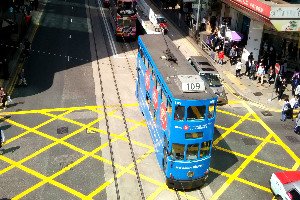 Hong Kong trams are excellent for tourist sightseeing.
Hong Kong trams are excellent for tourist sightseeing.
Both the 51 million Chinese coming from the Mainland and the 14 million foreign tourists and travelers who travel long distances to get to Hong Kong appreciated the HK culture and facilities in 2018.
Safe and happy tourists: Tourists find that the huge country parks are well tended and are fairly safe to hike around in and that park facilities and area tourist attractions are well tended. Everything seems to be advanced and efficient in HK.
The service people in the government institutions that foreign visitors may visit such as the museums, post offices, and libraries some across as respectful and efficient, and their facilities are quite modern, useful and tasteful.
The culture is quite a delight and surprising compared to the demeanor and facilities presented in many other Asian countries. Basically, a foreigner will usually feel quite safe.
The Outstanding or the Best in Other Ways Too
Travelers to Hong Kong appreciate the world's largest and most popular old-fashioned tram system on Hong Kong Island, the world's most popular and well known ferry, the Star Ferry, and one of East Asia's best cities for dining. The tram surprisingly ranks as one of the top 20 tourist attractions of China.
Highly rated culinary scene: The Hong Kong work ethic affords unusually good dining. Tourists highly appreciate Hong Kong's 63 Michelin-rated restaurants in 2019. There are more Michelin-starred restaurants in Hong Kong than in another other city in Asia except for cities in Japan.
Read more about Hong Kong Facts: Top for Tourism, Business, Wealth, IQ...
Hong Kong Customs and Traditions to Be Aware Of
Greeting and visiting: Hong Kongers generally greet Westerners by shaking hands lightly. It is good etiquette to bring a gift when visiting someone's home, but there are various intricate customs and superstitions regarding colors, numbers, and kinds of gifts to avoid or to give. Always present gifts with two hands, but gifts usually are not opened until after the visit is over.
Dining etiquette: When dining with a host, allow the host to tell you where to sit since there are seating arrangements that are usually based on seniority, age, status, and family relationships. Wait for the host to tell you to when to start eating or for him to begin eating. See more on How Dining is Done in Hong Kong.
Business etiquette: Business people should be aware that a person's business card is considered to be representative of and reflect the person. So if a business card is not well designed and printed and given in good condition, it gives a bad impression of the person.
The way one accepts a business card and treats it represents what he is doing to the person himself. So if you write on a business card, it is seen as an offence to the person (as if you wrote on him), or if you put a business card in a back pocket, it is considered as if you put the person in your back pocket (disrespectful).
Hong Kong Festivals
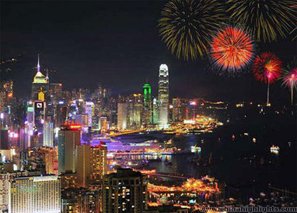 Hong Kong Chinese New Year fireworks
Hong Kong Chinese New Year fireworks
Traditional holidays: The major holiday festivals are the annual Chinese Spring Festival, Easter, the Dragon Boat Festival, the Mid-Autumn Festival, and Christmas and New Year.
Government promoted WinterFest season: The government has sponsored and supported the Hong Kong WinterFest as a long winter festival. This might be mainly to promote tourism, but it does make the region more cheery and exciting in the winter season. This combines several holidays: Christmas, and Western New Year week, and the Spring Festival including the Lantern Festival).
Special events festivals: There are also special theme or special events festivals such as the Hong Kong Sevens rugby championships.
For a list of Hong Kong festivals, see Hong Kong Festivals.
Hong Kong Religion
Due to Hong Kong's diverse ethnic makeup and complex fusion of nationalities and cultures, Hong Kongers have a diversity of religions and philosophical beliefs. The majority of Hong Kong's ethnic Chinese practice to some extent a variety of folk religions including Taoism.
The percentage of people who call themselves Buddhist is about 22%. The percentage who call themselves Christian is about 12%. About 2 to 3% are Muslim. About 22% are not religious.
Would You Like to Taste Hong Kong's Culture?
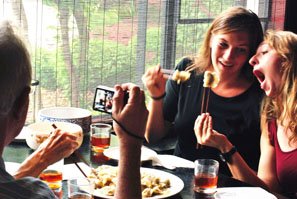 Having dim sum and yum cha is a traditional Cantonese social meal tradition.
Having dim sum and yum cha is a traditional Cantonese social meal tradition.
Hong Kongers love dining as well. In Chinese culture, a well known saying is: “Eating comes first." It is no different in Hong Kong. Hong Kongers emphasize eating for their health, as a pastime, and as a way to get together with others. Hong Kong's restaurant culture is in many ways unique to Hong Kong.
So you can experience HK culture quite directly by eating! Go to the dim sum, noodle shops, and restaurants serving Cantonese cuisine that locals like to go to experience the traditional culinary culture.
Dim sum and yum cha are a traditional brunch/lunch style of food that locals enjoy. Read How to Have Dim Sum and Yum Cha in Hong Kong to learn more about this style of food, its origins and the dining culture.
Local Restaurants Are Social Gathering Places
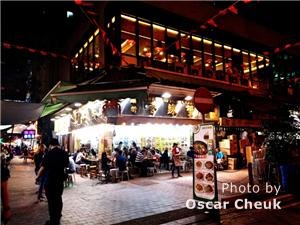 Temple Spice Crab is a Cantonese restaurant that both locals and tourists enjoy.
Temple Spice Crab is a Cantonese restaurant that both locals and tourists enjoy.
Restaurants are significant for Hong Kong people because they serve as social gathering places. Local people enjoy meal in groups with friends and family. Colleagues might share work-related news, and business people engage in business. Basically, restaurant-going strengthens the social relationships.
For the best Cantonese food: Of course, the best Cantonese restaurants in the world are in Hong Kong. You can taste it as made originally, and the seafood is the Hong Kong forte. See our recommended Hong Kong Cantonese gourmet restaurants>>
Experiencing Hong Kong Culture with Us
To give a general description in summary, Hong Kongers are culturally sophisticated, intelligent, fun loving, hard working, broody, adept at operating in both Western and Eastern worlds, somewhat pessimistic, and have a tendency to be more traditional in thinking as well as Christian and Westernized. They are so work orientated and independent, both men and women, that they have a tendency to not have children. They have a birthrate of about 1.1 children per person, among the lowest in the world.
 Our Create My Trip option lets us design your trip from your choices, like a delicious HK pick-and-choose meal, or HK's varied and selective culture.
Our Create My Trip option lets us design your trip from your choices, like a delicious HK pick-and-choose meal, or HK's varied and selective culture.
We could help you experience Cantonese culture by touring touring, dining in the restaurants, sightseeing, and going to a festival event.
Sightseeing Cantonese villages: Some small towns and areas are known for local cultural sightseeing. Among these, Kat Hing Wai (吉慶圍), a 17th century walled farming village, and Tai O, an old fishing village, stand out.
Seeing a festival event: We could escort you to one of the local Hong Kong holiday festival events. Hong Kong's Christmas celebrations are known internationally, and tourists might be interested in watching the annual international Dragon Boat races.
Visiting the museums: The Hong Kong History Museum and the Museum of Art are good places to become familiar with Hong Kong's culture.
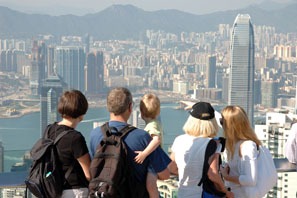 Enjoy Hong Kong and the rest of China with us.
Enjoy Hong Kong and the rest of China with us.
Our most popular Hong Kong tours, for inspiration:
- Half-Day Hong Kong Island Tour: You will admire the ultimate view of Hong Kong Island's renowned skyline and explore a floating fishing village at Aberdeen.
- One-Day Lantau Island Tour: This tour combines breathtaking natural beauty and fascinating culture.
Comments
Post a Comment